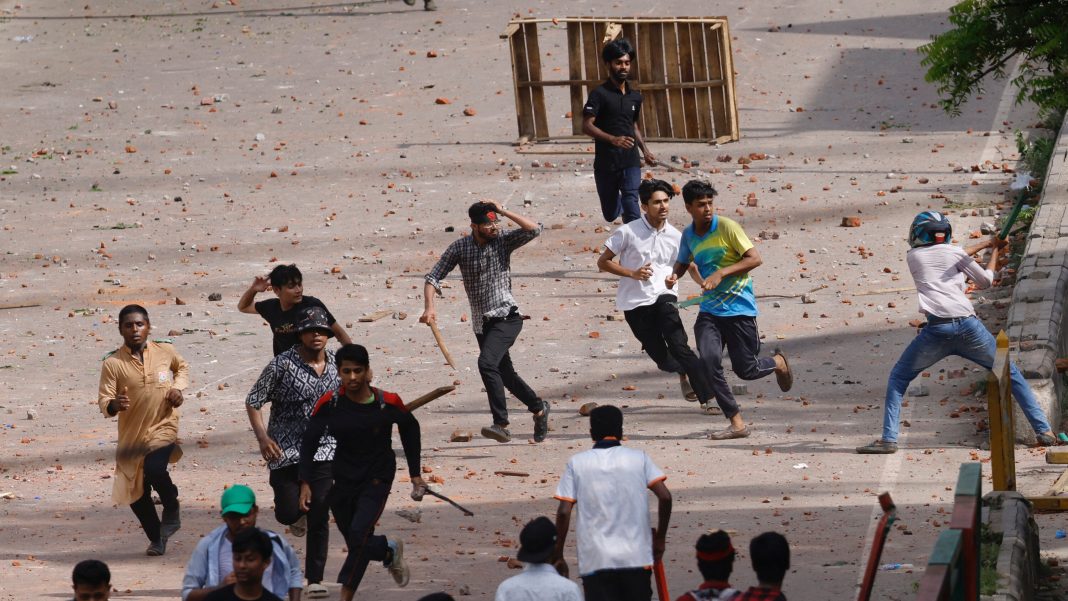Television news channels in Bangladesh went off the air, and telecommunications were widely disrupted on Friday amid violent student protests against government job quotas, resulting in nearly two dozen deaths this week.
There was no immediate response from the government.
The French news agency AFP reported that the death toll from Thursday’s violence had risen to 32. Reuters initially reported 13 deaths, adding to six earlier in the week, but could not verify the higher number.
Fresh violence erupted in some parts of the country on Friday, with police using tear gas to disperse protesters, according to a Reuters photographer.
India’s Economic Times reported that Prime Minister Sheikh Hasina’s government called in the army late on Thursday to help maintain order. Reuters could not independently verify this information.
Though the protests were triggered by student anger over the controversial quota system, some analysts believe that tough economic conditions, including high inflation, rising unemployment, and depleting foreign reserves, have exacerbated the situation.
The protests have also resurfaced old and sensitive political fault lines, especially among those who fought for Bangladesh’s independence in 1971, including Hasina’s Awami League.
Authorities cut some mobile services on Thursday to quell the unrest, but the disruptions spread nationwide on Friday morning, according to Reuters witnesses in Dhaka and New Delhi. International telephone calls were mostly disconnected, and internet calls were not completing.
Several Bangladesh-based newspaper websites were not updating on Friday morning, and their social media accounts were inactive.
Only some voice calls were working in the country, and there was no mobile data or broadband on Friday morning, a Reuters photographer in Dhaka reported. Even mobile-to-mobile text messages were not going through.
News television channels and the state broadcaster BTV were off the air while entertainment channels continued normal transmission, a Reuters witness said. Some news channels displayed a message indicating technical difficulties, promising to resume broadcasting soon.
Streets in the capital, Dhaka, were deserted on Friday, a weekly holiday. There was minimal traffic and few rickshaw pullers, with thin crowds near a vegetable and fish market. A protest rally was called at the main mosque around 0800 GMT.
The official websites of the Bangladesh Central Bank, the prime minister’s office, and the police appeared to have been hacked by a group calling itself “THE R3SISTANC3.” The messages read: “Operation HuntDown, Stop Killing Students,” and “It’s not a protest anymore, it’s a war now. Prepare yourselves. The fight for justice has begun,” with images of five men and two dogs, providing no details about them.
“The government has shut down the internet to silence us and hide their actions. We need to stay informed about what is happening on the ground,” the message added, asserting that the “spirit of our students remains unbroken.”
This nationwide agitation, the biggest since Hasina’s re-election earlier this year, has been driven by high youth unemployment. Nearly a fifth of the country’s 170 million population is out of work or education.
Protesters are demanding the end of a policy that sets aside 30 percent of government jobs for families of those who fought in the 1971 war of independence.
Although Hasina’s government scrapped the quota system in 2018, a high court reinstated it last month. The government appealed against the decision, and the Supreme Court suspended the high court order, pending a hearing on August 7.
On Thursday, the government offered to hold talks with the protesters, but they refused, stating, “Discussions and opening fire do not go hand in hand.”
Hundreds of people have been injured this week as police used tear gas and rubber bullets to break up groups of protesters who torched vehicles, police posts, and other establishments.
The capital’s main university campus has been the epicenter of the nationwide protests, but stronger demonstrations occurred in other parts of the city on Thursday.
Bangladesh is feeling the effects of the Russia-Ukraine war and secured a $4.7 billion bailout from the International Monetary Fund (IMF) in January 2023.
In June, the IMF concluded a second review of Bangladesh’s bailout program, providing the country with immediate access to about $928 million in loans for economic support and about $220 million to combat climate change.




